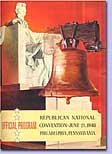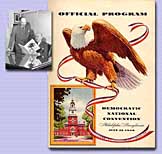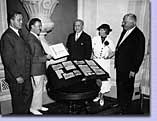|
|
The 24th Republican National Convention, with 1,094 delegates, met June 21-25 at Convention Hall in West Philadelphia. Bernard Samuel, a Republican, was mayor of Philadelphia. The delegates nominatedGovernor Thomas Edmund Dewey of New York on the third ballot. Governor Earl Warren of California was nominated as Vice President. Their platform included promotion of civil rights, an anti-lynching law, elimination of the poll tax, armed forces integration, passage of the Equal Rights Amendment, support for the United Nations, and support of the new nation of Israel. The final election went down to the wire, with even the Chicago Daily Tribune declaring "Dewey Defeats Truman." |
| Less than a month later, July 12-15, the 30th Democratic National Convention met in the same hall with 1,592 delegates. Harry Truman was nominated on the first ballot. Like the Republicans, the Democrats too supported civil rights, anti-lynching, abolition of the poll tax, the UN, and Israel. Unlike the conventioneers in June, however, these delegates reaffirmed New Deal domestic programs. Southerners, however, were upset about the strong civil rights language in the platform without a concurrent "states' rights" plank. The entire delegation from Mississippi and half the Alabama delegates walked out of the convention. These and other disgruntled Southerners, called Dixiecrats, vowed to hold a convention in Birmingham to nominate a states' rights candidate; which they did, nominating Strom Thurmond. Despite the walkout, in the end Truman carried fifty percent of the popular vote in the South |
|
| Later that month, on July 23-25, the Progressive National Party also met at Convention Hall and rallied in Shibe Park. The 3,240 delegates attending nominated Henry Wallace for president. Wallace had been Vice President under Roosevelt and later served as Secretary of Commerce in the Truman administration. The Progressives stood for peace between the U.S. and the Soviet Union, ending the Truman Doctrine and the Marshall Plan, no military draft, and complete desegregation. The convention was unique in another aspect in that it was the first major political convention to have the keynote address delivered by an African American. Branded a Communist by his foes, Wallace lost by a huge margin with only two percent of the popular vote. Many early Progressive supporters returned to the Democratic fold and helped Truman win the election. |


![[Badge with image of Harry Truman] Philadelphia Badge Co., 1948](images/thumbnails/1948_truman_big.jpg)


